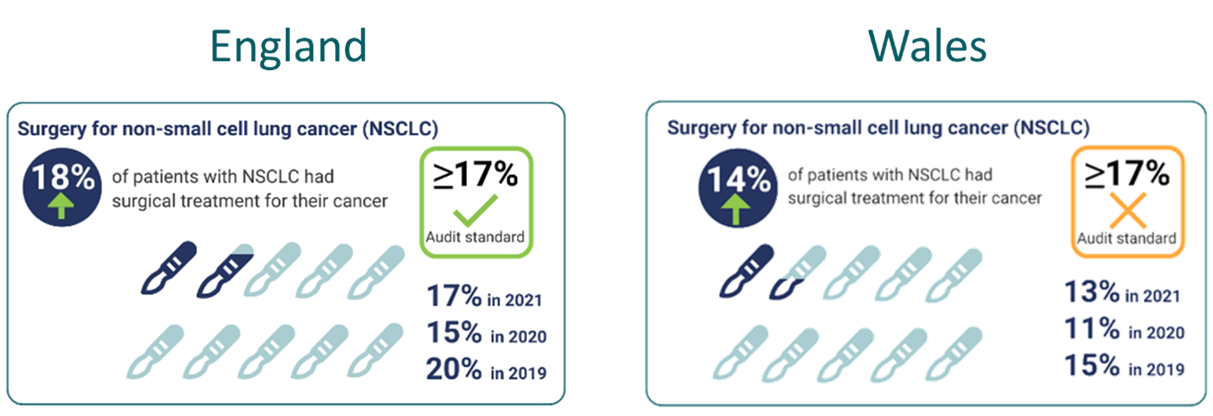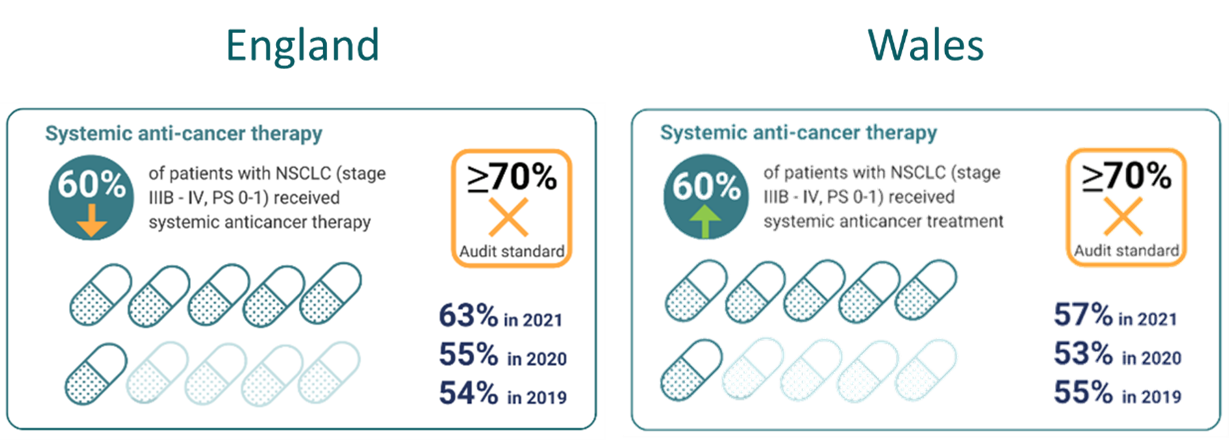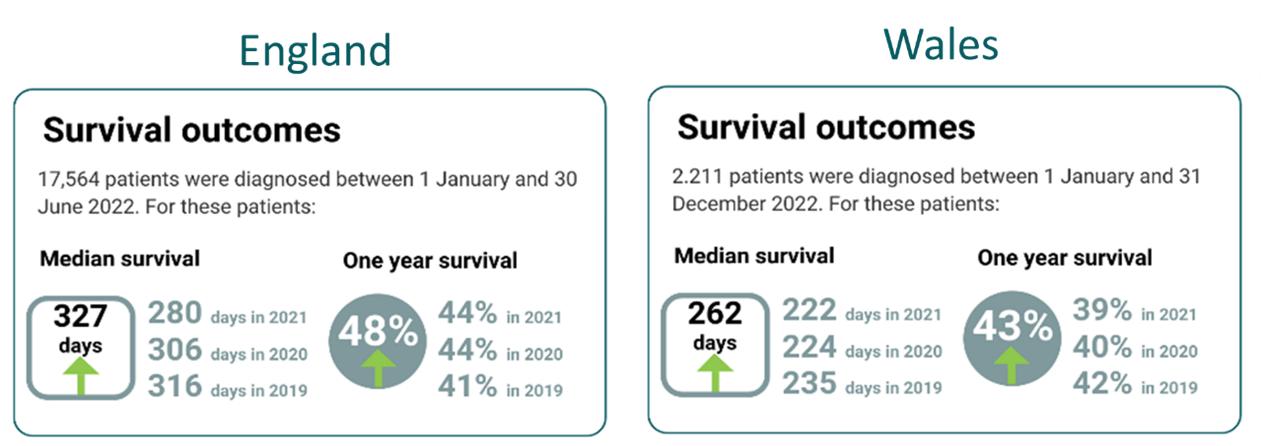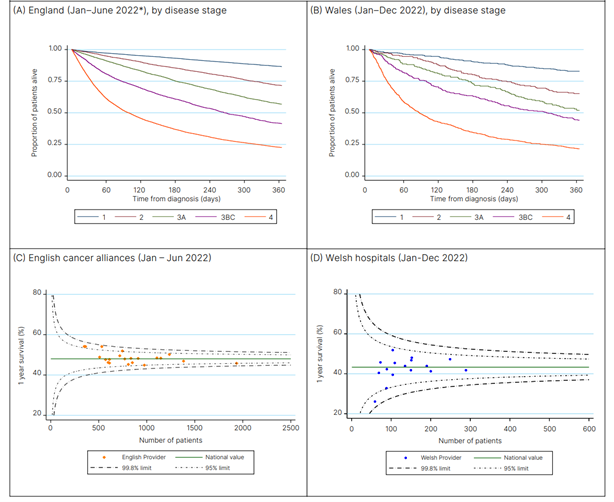Where are we now? Findings from the new National Lung Cancer Audit ‘State of the Nation’ Report
The National Lung Cancer Audit (NLCA) evaluates how the care received by people diagnosed with lung cancer in England and Wales compares with recommended practice and provides information that supports healthcare providers, commissioners, and regulators to improve the care of patients.
The second, and recently-published State of the Nation report 2024, gives an overview of the patterns of care and outcomes for the 36,886 people diagnosed with lung cancer in England and 2,211 people diagnosed in Wales in 2022.
An important and encouraging finding from the 2022 data is that the proportion of patients with lung cancer who are diagnosed with stage I/II disease has increased from 30.5% in 2021 to 33.8% in England and from 24% in 2021 to 30% in Wales. Some of this increase may be due to the impact of the Targeted Lung Health Checks (TLHC) Programme in England that diagnosed 1,087 cases in 2022.
Diagnosing people with lung cancer at stage I/II means more patients should be receiving treatment with curative intent. It is reassuring that curative treatment rates for patients with early-stage lung cancer have been maintained (at 78% in England; 76% in Wales), despite the growth in demand due to the increase in early-stage presentations. More lung cancer resection surgery was performed in England in 2022 than ever before with 6,236 operations compared to 5,392 in 2021.
However, despite the increase in overall thoracic surgery, the proportion of patients with Non-Small Cell Lung Cancer (NSCLC) undergoing surgery has not yet returned to pre-pandemic levels (18% in 2022; 20% in 2019). This highlights the importance of providers preparing to accommodate the expected increase in surgical activity caused by the national rollout of the TLHC programme.

Unfortunately, waiting times from ‘Decision to Treat’ to the start of first treatment have continued to lengthen in 2022 - in both England and Wales. The National Optimal Lung Cancer Pathway (NOLCP) recommend that the time from referral to the start of treatment is less than 49 days and that the time between diagnosis and the start of treatment is a maximum of 21 days. In 2022, the median time from ‘Decision to Treat’ to starting treatment for patients with stage IV NSCLC was 43 days in England and 52 days in Wales. Additional resources are urgently required to bring Trusts in line with the latest service specification and NOLCP set out by the RCLCF clinical expert group.
In England and Wales in 2022, 60% of patients diagnosed with NSCLC (stages IIIB-IV, PS 0–1) had Systemic Anti-Cancer Therapy (SACT). Only 44 of 124 NHS trusts (35%) met or exceeded the NICE and NLCA audit standard of 70% for patients with NSCLC (stages IIIB-IV, PS 0–1) receiving SACT. NHS Trusts should monitor their performance against the NLCA standard and ensure there are necessary resources for biomarker testing as well as timely access and adequate capacity for SACT delivery.

In this State of the Nation report for patients diagnosed in 2022, the highest ever survival for patient with lung cancer has been reported. In England, the one-year survival was 48% and the median survival was 327 days. In Wales, the one-year survival was 43% and the median survival was 262 days. It is hoped that with earlier diagnosis and improvements in treatment modalities, these survivals will continue to improve.


For England, data used in the report was derived from the Rapid Cancer Registration Dataset (RCRD). The completeness of demographic data items (age, ethnicity, social deprivation) was excellent, being complete for over 95% of records, with little variation between NHS trusts and cancer alliances. Levels of completion on patient smoking status and whether a lung cancer nurse specialist (LCNS) was present at diagnosis were 48.2% and 60.3%, respectively, well short of our target of 90% for both data items. There was substantial variation between NHS Trusts in the completeness of these two data items. It is also important that NHS Trusts use the ‘route to diagnosis’ data item to record patients diagnosed after screening by the TLHC. Good quality data on the route to diagnosis is essential for the impact of screening on outcomes to be evaluated.

In 2023, the NLCA introduced dashboards that are updated on a quarterly basis for English NHS Trusts. While biomarker results are not currently available, in 2024, data will be available from the Genomic Laboratory Hubs (GLHs). The NLCA plan to use these data to further explain patterns of care for patients with advanced lung cancer to complement the improvements seen in early-stage lung cancer seen in this State of the Nation report.
The full report as well as supplementary material can be found on the NLCA website: https://www.lungcanceraudit.org.uk/reports-publications/nlca-state-of-the-nation-2024/.
The results for individual NHS providers in England can be accessed via an interactive web-based dashboard https://www.lungcanceraudit.org.uk/data/.